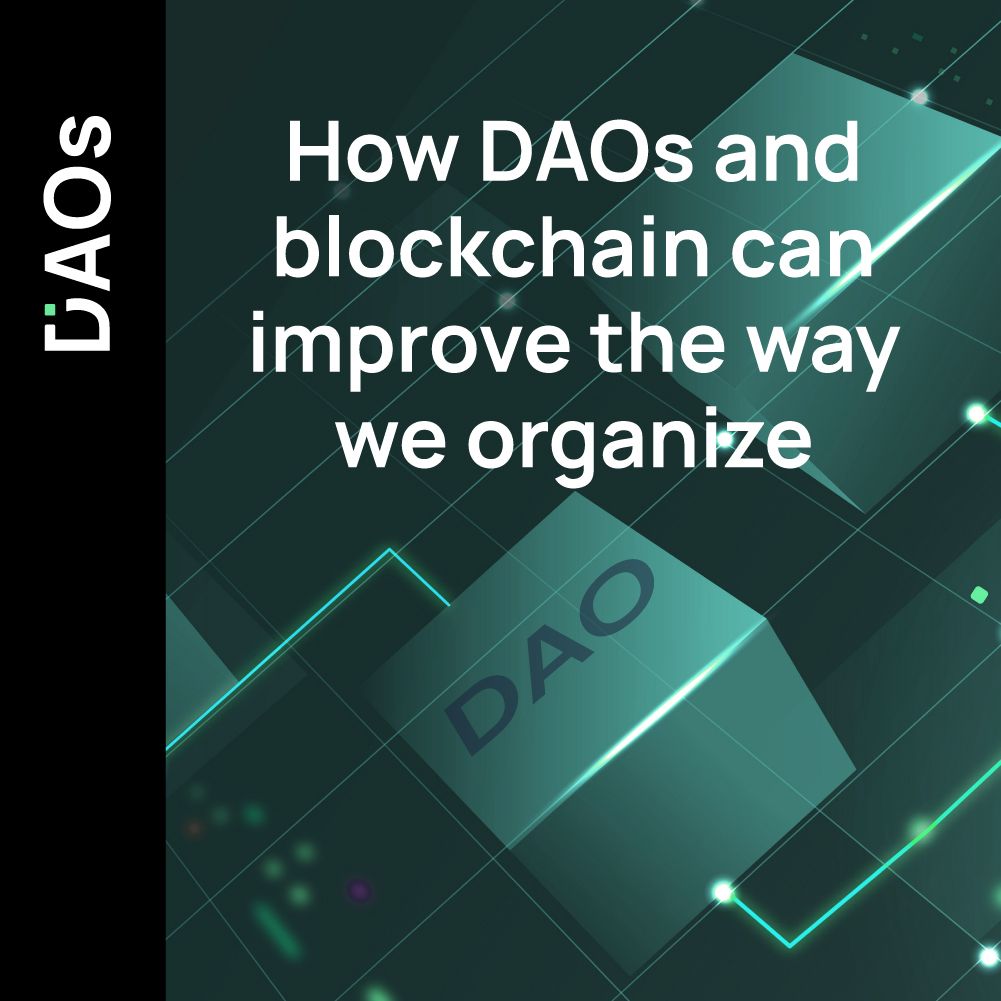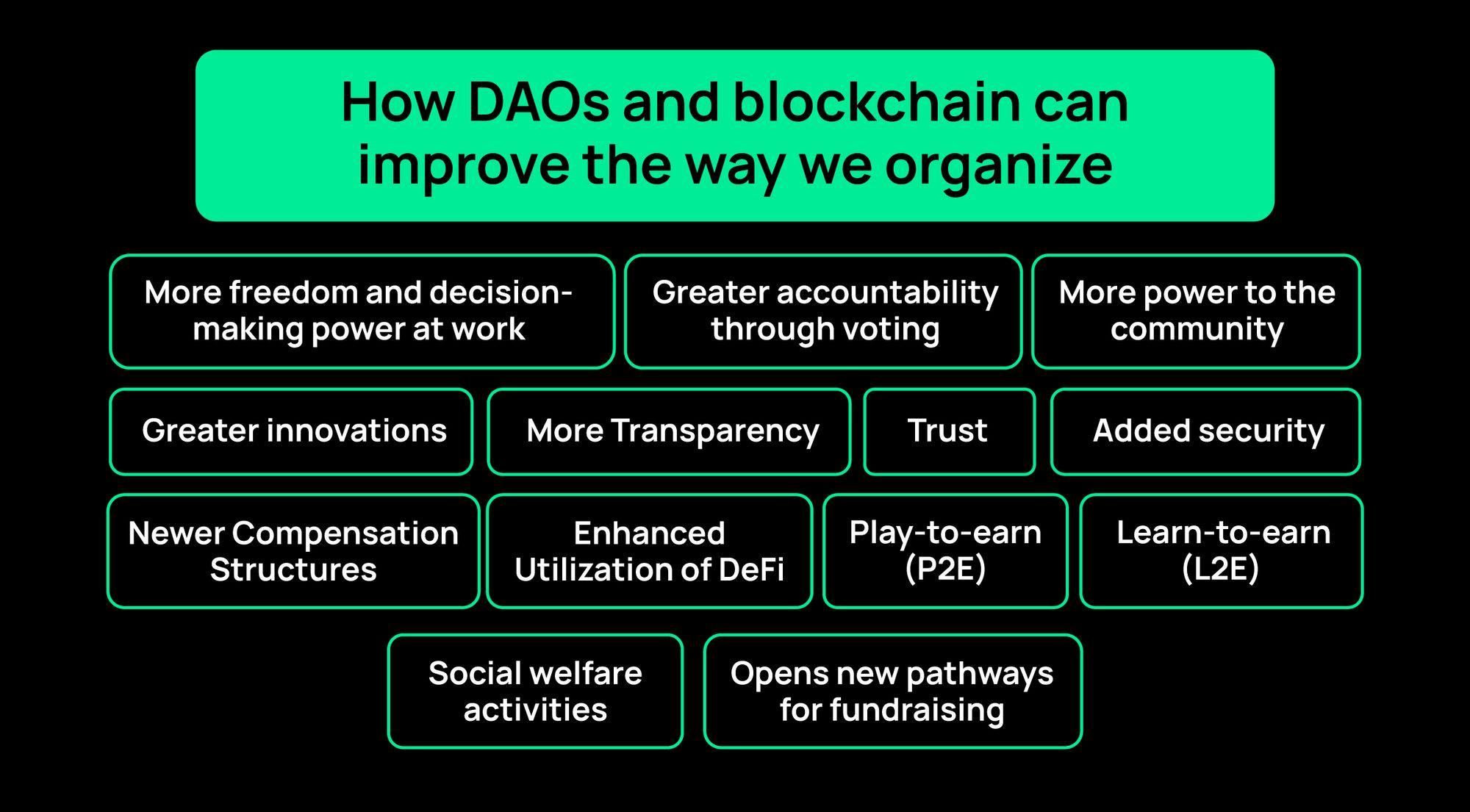11: How DAOs and blockchain can improve the way we organize

DAOs, or Decentralized Autonomous Organizations, promise to transform how we work and are steadily changing the way we think about organizational structures and the future of work.
Their unique structure allows DAOs to focus on community and collaboration rather than just profit and unilateral-decision making, resulting in potentially socially-conscious systems.
DAOs are self-managed organizations governed by a transparent set of rules (or smart contracts) encoded on the blockchain. These self-executing contracts reduce the need for managers and traditional hierarchies since the organization's rules are embedded into the code already.
DAOs can make organizational decisions collectively and autonomously through decentralized governance. This is different from traditionally centralized organizations where executives and large shareholders can hold disproportionate control.
So what could be the ways in which DAOs alter the way we work and improve the way we organize? Let's read the article to find out.
Trust
DAOs offer immediate trust and transparency for entities to focus on achieving their collective goals. The participants don't need to know each other as the rules of engagement are embedded in a transparent, safe, and open-source blockchain record. Because blockchain ledger is tamper-proof, no participant can alter the practices without a majority vote. So, the only role of a DAO entity is to advance the collective interest of a group.
Greater accountability through voting
DAOs bring greater accountability to how organizations function through their collective voting mechanism. Traditional organizations follow the decisions made by a few members at the top. However, that is not possible in a DAO where members need to vote for all key decisions. This is democracy and decentralization at play instead of centralization, giving power in the hands of the members along with great responsibility and ownership.
More power to the community
DAOs introduce new ways to organize your community. In DAOs, the community benefits from transparent organization, easier fundraising, and serving essential needs. For example, imagine your local municipal government forming a DAO to organize local projects. Thanks to the DAO's structure, everyone in your local community will have an equal role in its activities.
Take the example of Friends with Benefits DAO. The membership costs 75 FWB (Friends With Benefits native) tokens, giving access to a large global community of artists, innovators, and creatives. The organization surrounding the DAO token provides its members an incentive to generate value constantly.
Greater innovations
The decentralized approach of DAOs allows for bottom-up innovation with greater speed to market. iDAOs are community-oriented, and one of their significant features is active discussions on their private channels. These also encourage productive discussions and innovation. If enough members of a DAO believe in a specific idea or want to build something innovative, they can do so through a voting round and execute it quickly via the smart contract.
Besides, DAOs also attract investments from innovative investors and accelerate Decentralized Finance (DeFi) adoption, which is highly creative. It involves fast and low-cost transactions outside the authority's control, speeding up how DAOs operate.
Added security
DAO structure is free from the corrupt structures of centralized organizations. There is no concentration of power in the hand of a few, and no single entity controls DAOs. The organization's rules are clearly stated for all members to see, and if the community members choose, they can vote to change them.
Having such a structure over a secure blockchain and its digital ledger adds layers of security to the organization. All transactions are transparent and have timestamps which breed more trust among the community without needing an external third party.
More freedom and decision-making power at work
The nature of DAOs is such that it frees you to focus on the most creative and valuable work. With the automation of repetitive tasks such as correspondence and transactions, members can focus on more strategic tasks.
Further, DAOs allow people to work from anywhere in the world; all they need is an internet connection.
Another perk of DAOs is the decision-making power. All significant decisions are made by voting; hence, all members feel included and connected with their organization.
Opens new pathways for fundraising
With DAOs in the mix, the fundraising process has found new dimensions. For instance, you can build DAOs to accept membership from people interested in supporting a cause. This DAO can sell crypto tokens to the interested members and collectively decide how to utilize the funds through a transparent voting process.
Besides, DAOs can conduct fundraisers through NFT auctions or other social media campaigns. An ideal example is the Ukraine DAO which supported Ukrainians affected by the war with Russia. By selling NFTs and accepting cryptocurrency donations, they raised more than $8 million.
More transparency
In traditional systems, decisions are often top-down and unilaterally announced at board meetings; in contrast, DAOs bring complete transparency to organizational structures. Its members vote upon all crucial decisions, and the session details are available on the blockchain for public viewing.
It revolutionizes how accountability and transparency work.

Social welfare activities
With DAOs, members and donors know exactly how much donations flow in and what they are spent on. Moreover, members get to play a part in the allocation of funds, so the operations are trustworthy, measurable, and transparent.
Through tokenization, DAOs also help with attaching incentives to social activities to encourage greater participation and enthusiasm for the cause.
Consider the Tree DAO. Its mission is to motivate people to plant trees. And they use the native token 'TREE' to incentivize those who participate in its mission. For every new tree planted, the DAO gives away one TREE token, and they can exchange the DAO token for goods or choose membership in the DAO.
Enhanced Utilization of DeFi
DeFi represents all financial transactions and applications supported by blockchain and allows economic activities without a central authority like the bank. DAOs enable complete utilization of Decentralized Finance (DeFi) by helping DeFi users get more organized in crypto trading and transactions. Besides, DAOs have the potential to mainstream DeFi in the coming years.
Newer Compensation Structures
While DAOs are likely to have a few key members or contributors who might be engaged full-time or even earn salaries, most people contributing to DAOs will instead complete individual tasks such as creating content, moderating online community forums, and so on. These members or contributors can work-to-earn (W2E) and generate either native tokens or fiat currency.
The earned tokens can be traded on exchanges such as Bit.com crypto exchange or UniSwap decentralized exchange for other tokens or fiat currencies and represent ownership in a DAO.
Token holders can then use various platforms to stake their tokens. This effectively amounts to depositing tokens into a central liquidity pool where they're used to validate blockchain transactions and earn APY (annual percentage yield), which in some cases can exceed 20%.
Another remuneration model is P2E (play-to-earn).
Take a look at Axie Infinity, a token-based video game where gamers collect, breed, raise, battle, and trade creatures known as Axies. Unlike conventional video games, where players don't actually own their characters or features, in this game, players own their Axies as NFTs and can sell them on the game's marketplace to earn money.
In a market like the Philippines, the average Axie gamer, typically a teenager, earns about $10 - $20 per day playing the game, which is on par with the country's average salary.
Learn-to-earn (L2E) is yet another example of earning through DAOs.
An example is the platform RabbitHole, which pays users to learn about Web3 applications. Users could also earn through other models, such as create-to-earn (C2E) by writing content or designing artwork in exchange for tokens or use-to-earn (U2E), where users post comments on a platform or engage with Web3 social media applications to earn tokens.
Token holders can also speculate on their tokens, the price of which might increase in value over time-based on supply and demand, much like traditional shares in a company.
In a nutshell
There are many ways in which DAOs could bring about a fundamental shift in how we work by creating a new structure, greater transparency, increased collaboration, and trustworthy autonomy for businesses, and it is possible that not all of them may become mainstream. However, it is indisputable that DAOs are here to stay and provoke us to change for the better in the long term.

